 The Columbia City Yoga on-line Moving into Meditation class met this morning. We reflected on our love for the natural world. We contemplated the vulnerability that arises upon feeling the precarity of climate change. Practice allows us to feel difficult truths. Uncertainty can be fertile ground from which compassionate action can arise.
The Columbia City Yoga on-line Moving into Meditation class met this morning. We reflected on our love for the natural world. We contemplated the vulnerability that arises upon feeling the precarity of climate change. Practice allows us to feel difficult truths. Uncertainty can be fertile ground from which compassionate action can arise.
We heard an excerpt from Sophie Strand’s latest newsletter, A Generous Uncertainty. Sophie writes delightfully about the generative ground of uncertainty and making mistakes:
The only thing I am certain of right now is that I am constituted by a generous uncertainty. An uncertainty that gestates miracles I could never have expected or authored. I am certain that I am not the most reliable narrator. I have found that the space I hold for being wrong acts like a freshly mulched garden. Relationships sprout there, in the connective tissue between opposing ideas, that would never have grown in the relationally sterile bounds of a well-defended belief.
We drew on Lama Willa Blythe Baker’s essay, Five Practices for Working with the Immense Challenge of Climate Change. Lama Baker, Ph.D. is the Founder of Natural Dharma Fellowship in Boston. She is the author of four books including The Wakeful Body: Somatic Mindfulness as a Path to Freedom. You can hear her fascinating interview, How to Get Out of Your Head with Dan Harris on the Ten Percent Happier podcast.
We drew inspiration from Roshi Joan Halifax’s view that every human is a river of life.
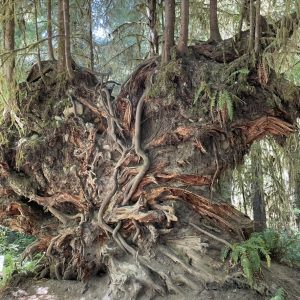 We ended with Rebecca del Rio’s Prescription for the Disillusioned. The poem is drawn from her eponymous collection which:
We ended with Rebecca del Rio’s Prescription for the Disillusioned. The poem is drawn from her eponymous collection which:
is an invitation to enter into a world of the magical mundane, a meditation on the curious and unique life given to everyone. . . . The poems are a response to the human condition, a conversation with life and loss, as well as an uncovering of the mystical in the day-to-day walk that we call our lives.
Guided Reflection
Welcome. Here we are together in the midst of another Summer. In the Northwest, our flowering friends are opening their faces to the sun. Their petals are withering and luscious fruits are forming: blueberries, blackberries, raspberries, salmonberries, thimbleberries and huckleberries. There is a beautiful tenderness in the way they offer themselves up to life – seeding and sustaining – nourishing humans and more than humans.
We, too, have a tender fruit that we offer the world when our hearts are open: Compassion. Our compassion ripens with the light of our minds, the warmth of our hearts and the water of our tears. We can offer our compassionate awareness to each other. We can offer it to Earth’s fields and forests, mountains and rivers, glaciers and oceans. Our natural world is in peril. Every day we lose more strands in the web of life.
Right now we can notice how the depth of these words land in our hearts. This is why we practice. We practice to keep our hearts open. We practice so that we may hold our perilous time in the tender gravity of compassion.
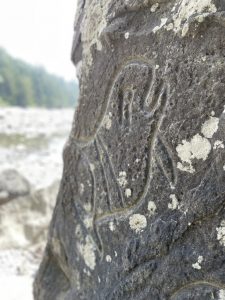 Poet Sophie Strand offers these suggestions:
Poet Sophie Strand offers these suggestions:
“Try to love the questions themselves,” the poet Ranier Maria Rilke advised. “The point is to live everything. Live the question now.” How can we develop an empathy for other belief systems? A muscularity for changing our minds? The more generously, joyfully uncertain we become, the more we will create ecosystems rather than malnourished houseplants. Questions, unlike answers, are relational. They involve another person, another landscape, another being. Like mycorrhizal systems below ground, they stitch plant to tree to dirt to bacteria. They create resilient community. Let us learn to live interrogatively. Let us, like electrons, live between energy levels, between particle and wave, self and ecosystem.
Author Willa Baker encourages us to access our Bodily Wisdom to cultivate compassion. She writes:
To encounter our human body is to encounter the natural world. . . . The closer we come to the body, the closer we draw to the truth of our own wildness. This connects us to the planetary wildness that we aspire to protect.
While the mind is tugged into the past and future, the body is fully present. The body’s present wakefulness is one of its great wisdoms, and we can easily access that wisdom. It is as close to us as this moment’s inhale and exhale. While we want to stay mindful of creating a sustainable future, we don’t want to do that at the expense of missing our life. The body reminds us that we are here, now, and our presence is our most powerful resource.
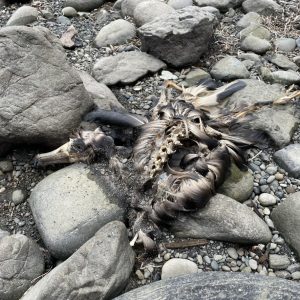 Take a moment to sense. How are you experiencing your body today? You might feel the spine, a column of support holding you up. Sense the bony firmness where your body meets Earth’s body. You might sense the air around you and how how it enters you. Feel breathing coming, going, pausing, flowing.
Take a moment to sense. How are you experiencing your body today? You might feel the spine, a column of support holding you up. Sense the bony firmness where your body meets Earth’s body. You might sense the air around you and how how it enters you. Feel breathing coming, going, pausing, flowing.
Let yourself be nourished by the breath; supported by Earth. Become aware of any sense of ease, comfort or support. Can you receive these gifts so freely given? As you become aware of any tension in your body, soreness in your heart, difficulty in your mind, can you offer yourself some tenderness? Perhaps being with the question: ‘What is needed now?’ Let the answers surface naturally, in the body’s time. If the answer is “I don’t know” Can you cultivate a sense of spaciousness as you breathe? Can you hold the vulnerability of not knowing with caring presence? Or perhaps place a soothing hand over the tender areas of your body?
To encounter the human body is to encounter the natural world. How is it be a breathing conscious being, a strand in the web of life? Can you broaden your awareness to include your inter-being in the web? Can you be with what arises?
Perhaps a particular creature, landscape or waterway may come to mind. You might attune to who or what it is that you love. That place or being that needs your caring.
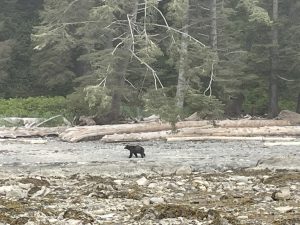 I invite you to let the breath be easy. Feel what you are feeling. It may be fear, sadness, anger or despair. Notice any tendency to pull away, to be overwhelmed. That’s o.k. you can come back to the breath or your surroundings. You can give yourself space, take a break. When you’re ready you can return to the sense of being in a field of kindness and caring. You might imagine our circle of support as a wider field of compassion.
I invite you to let the breath be easy. Feel what you are feeling. It may be fear, sadness, anger or despair. Notice any tendency to pull away, to be overwhelmed. That’s o.k. you can come back to the breath or your surroundings. You can give yourself space, take a break. When you’re ready you can return to the sense of being in a field of kindness and caring. You might imagine our circle of support as a wider field of compassion.
You are part of this circle and this circle is a part of you. Roshi Joan Halifax reminds us that:
Each person is a river of life. I have found myself nourished by so many strong and beautiful rivers.
May we feel ourselves as nourishing, strong and beautiful rivers flowing through our troubled world. May we remember we are part of a circle of many compassionate beings. When we realize our precarity, the tender vulnerability we share, we can recall those who actively care and protect humans and more than humans.
In her reflections about the myriad consequences of climate change, Willa Baker encourages us to welcome uncertainty. She writes:
Today we are pausing to reflect on the truth of our vulnerability so that we may cultivate the courage and resolve to stay open and engage with the world. Here is poet Rebecca del Rio’s Prescription for the Disillusioned:
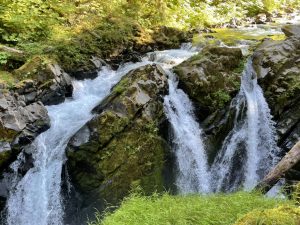 Come new to this day.
Come new to this day.
Remove the rigid overcoat of experience,
the notion of knowing,
the beliefs that cloud your vision.
Leave behind the stories of your life.
Spit out the sour taste of unmet expectation.
Let the stale scent of what-ifs waft back into the swamp
of your useless fears.
Arrive curious, without the armor of certainty,
the plans and planned results of the life you’ve imagined.
Live the life that chooses you,
new every breath, every blink of your astonished eyes.
May we come new to this day. May we be curious, without armor and embrace life anew with every breath.

